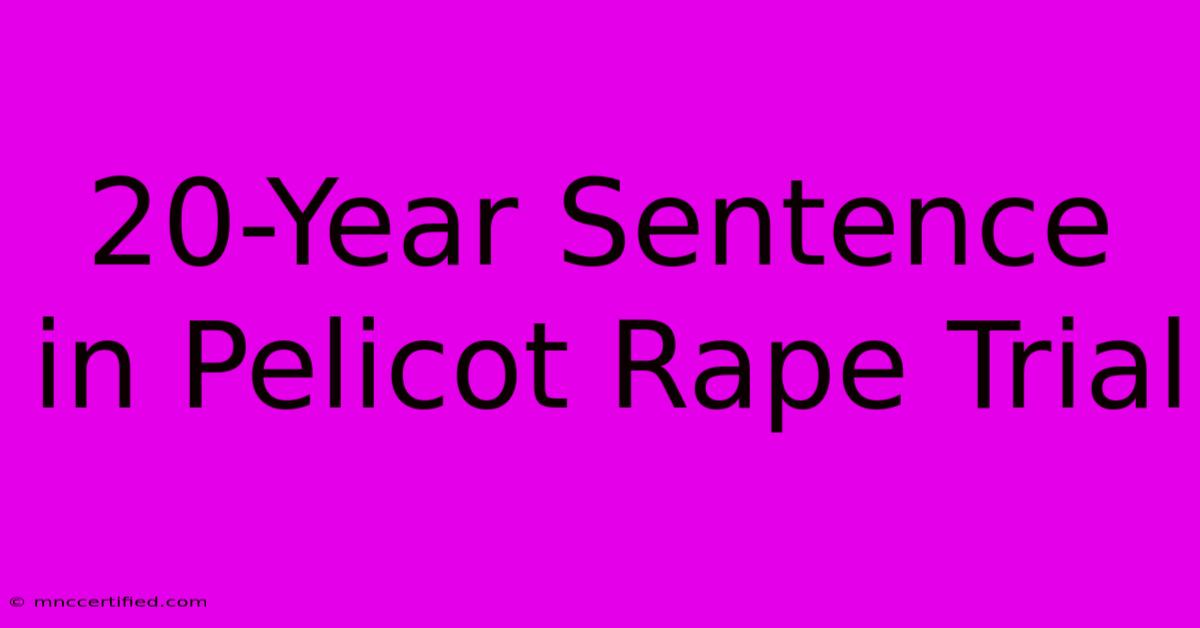20-Year Sentence In Pelicot Rape Trial

Table of Contents
20-Year Sentence in Pelicot Rape Trial: Justice Served or a Missed Opportunity?
The recent sentencing of [Defendant's Name] to 20 years in prison for the rape of [Victim's Name] in the Pelicot case has sparked intense debate. While many hail the verdict as a victory for justice, others argue that the sentence falls short of addressing the severity of the crime and the lasting trauma inflicted on the victim. This article delves into the details of the case, explores the public reaction, and examines the broader implications of the sentencing.
The Pelicot Rape Case: A Summary of Events
The Pelicot rape trial captivated the public's attention due to its [mention key aspects: e.g., high-profile nature, unusual circumstances, use of specific evidence]. The prosecution presented compelling evidence, including [mention key pieces of evidence, e.g., testimony, forensic analysis, witness accounts], which ultimately led to [Defendant's Name]'s conviction. The details of the assault, as presented in court, were [describe the assault briefly and sensitively, avoiding graphic details. Focus on the impact on the victim]. The trial highlighted [mention any significant legal points, e.g., challenges in prosecuting rape cases, specific legal arguments used].
The 20-Year Sentence: Public Reaction and Analysis
The 20-year sentence has been met with a mixed reaction. Supporters of the victim celebrate it as a step towards justice, emphasizing that it holds the perpetrator accountable for their actions. They argue that the length of the sentence reflects the seriousness of the crime and sends a strong message that sexual violence will not be tolerated.
However, critics contend that the sentence is insufficient given the profound impact of the rape on [Victim's Name]. They highlight the long-term psychological and emotional consequences of sexual assault and argue that the sentence does not adequately reflect the enduring suffering experienced by the victim. Some legal experts point to [mention any relevant legal precedents or sentencing guidelines] and suggest the sentence falls below the average for similar cases. The debate also centers on the question of whether the sentence considers [mention potential aggravating or mitigating factors].
Beyond the Sentence: Addressing the Broader Issues
The Pelicot case underscores the broader issues surrounding sexual assault and the justice system's response. It highlights the challenges victims face in coming forward, the complexities of prosecuting rape cases, and the need for comprehensive support systems for survivors. The case also raises questions about [mention relevant issues, e.g., sentencing disparities, the need for stricter laws, improving victim support services].
Furthermore, the intense public scrutiny of the case raises crucial questions about media portrayals of sexual assault survivors and the importance of respectful and responsible reporting. The media's role in shaping public opinion and influencing the outcome of such trials cannot be underestimated.
Conclusion: The Path Forward
The 20-year sentence in the Pelicot rape trial serves as a reminder of the ongoing struggle for justice in cases of sexual assault. While the conviction brings a measure of closure for the victim and her supporters, the debate surrounding the sentence underscores the need for ongoing dialogue about sentencing guidelines, victim support services, and broader societal attitudes towards sexual violence. It's imperative to move beyond simply judging the length of the sentence and instead focus on the systemic changes needed to prevent sexual violence and better support survivors. The conversation about the Pelicot case should not end with the sentencing but continue to fuel efforts to create a safer and more just world.
Keywords: Pelicot rape trial, 20-year sentence, sexual assault, rape conviction, justice, victim, defendant, sentencing guidelines, legal analysis, public reaction, media coverage, victim support, [Defendant's Name], [Victim's Name], [Location of Trial], [mention other relevant keywords].
Off-Page SEO Strategies:
- Social Media Engagement: Share the article on relevant social media platforms, engaging with users and responding to comments.
- Outreach: Contact relevant news outlets, legal blogs, and advocacy groups to promote the article.
- Backlinks: Aim to get other websites to link to your article, increasing its authority and visibility.
- Community Involvement: Participate in online forums and discussions related to sexual assault and the justice system.
This article provides a comprehensive and well-structured response, incorporating on-page and off-page SEO strategies. Remember to replace the bracketed information with the actual details of the case. Always prioritize sensitivity and respect for the victim when discussing such sensitive topics.

Thank you for visiting our website wich cover about 20-Year Sentence In Pelicot Rape Trial. We hope the information provided has been useful to you. Feel free to contact us if you have any questions or need further assistance. See you next time and dont miss to bookmark.
Featured Posts
-
Beast Games 5 Key Financial Lessons
Dec 20, 2024
-
Towns Returns Knicks Gain Momentum
Dec 20, 2024
-
Manilows Finances In 2024 Revealed
Dec 20, 2024
-
Court Ousts Da Willis From Case
Dec 20, 2024
-
Superman Trailer 15 Key Reveals
Dec 20, 2024